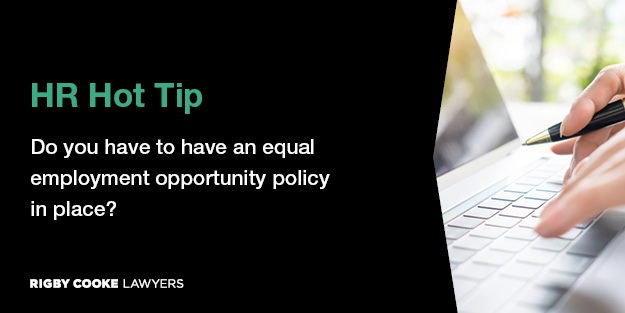Welcome to our series of HR interviews with Lawyer Monika Nosal who answers some of the most common questions asked by HR managers regarding employees’ legal entitlements.
Equal employment opportunity (EEO) is the principle that all employees are treated fairly and provided equal access to employment opportunities, without discrimination.
In Australia, both Federal and State legislation prohibits discrimination in a range of aspects of employment on the basis of certain unlawful grounds, including:
- age
- sex
- race
- religion
- disability
EEO policies can assist employers in promoting EEO in their workplace and, in turn, complying with their legal obligations under these laws.
Further, employers with robust EEO policies can create an efficient system to mitigate legal liability in the event an employee makes a complaint about unequal employment practices.
We recommend employers:
- develop and implement EEO policies that apply to all employees and during all employment processes, including recruitment
- ensure these policies and processes are communicated to employees
- provide training to employees on their rights and responsibilities regarding EEO
- establish a process for managing and responding to complaints
Employers obligations under the National Employment Standards, modern awards, enterprise agreements and contracts can be complex, overlapping, and at times confusing.
Employers need to familiarise themselves with and understand their legal obligations in order to avoid any possible claims by employees (both existing and former) and unsuccessful job applicants, as well as prosecution by the Fair Work Ombudsman. Under the accessorial liability provisions of the Fair Work Act 2009 (Cth), employers and individuals such as directors and HR managers can be personally held accountable for breaching workplace laws in certain circumstances.
A HR Legal Audit conducted by Rigby Cooke can provide the HR function and, in turn, provide employers with comfort in knowing that they are legally compliant, or at least provide advance warning of any potential compliancy issues before they become problematic.
| Disclaimer: This publication contains comments of a general nature only and is provided as an information service. It is not intended to be relied upon as, nor is it a substitute for specific professional advice. No responsibility can be accepted by Rigby Cooke Lawyers or the authors for loss occasioned to any person doing anything as a result of any material in this publication.
Liability limited by a scheme approved under Professional Standards Legislation. ©2020 Rigby Cooke Lawyers |

